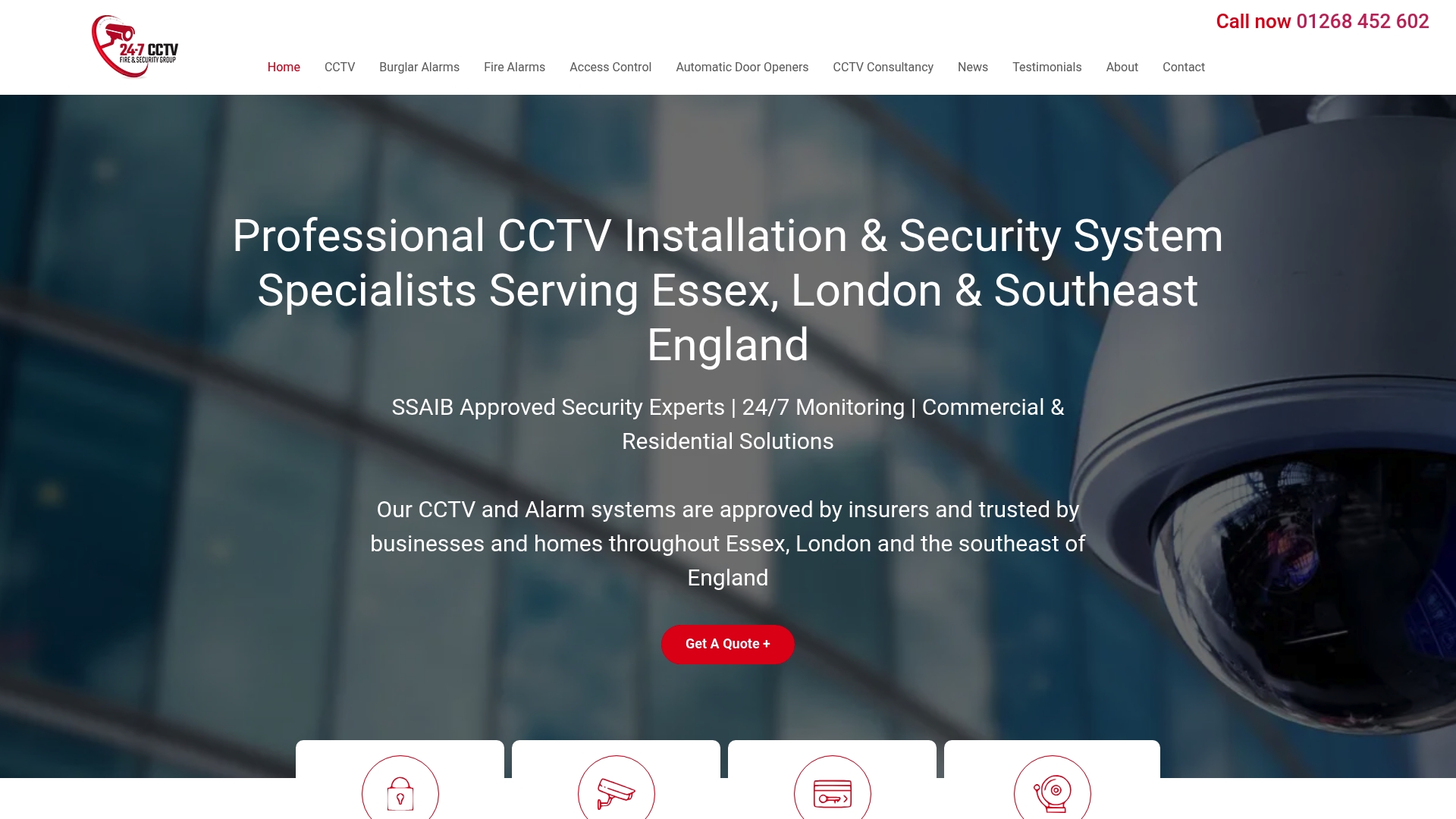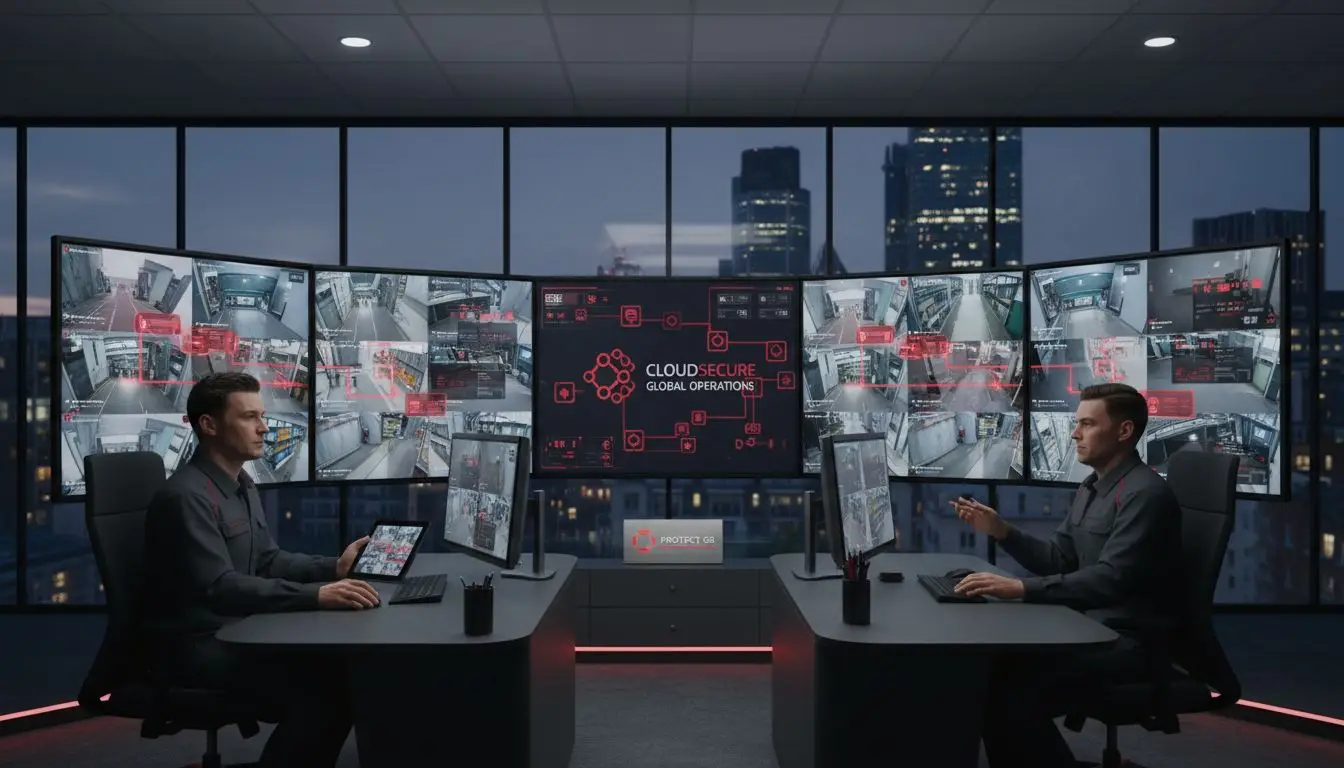Did you know that over 80 percent of UK businesses now use some form of video surveillance to protect their property? Security has shifted from bulky equipment to smart solutions that work from anywhere, making the way we keep spaces safe more flexible than ever. Cloud CCTV offers more than just off-site storage, giving businesses and homeowners tools to watch, analyse, and secure their environments with ease and control.
Table of Contents
- What Is Cloud CCTV and How It Works
- Types of Cloud CCTV Systems in the UK
- Key Features and Real-World Applications
- Legal Requirements for Cloud CCTV Usage
- Benefits, Risks, and Cost Implications
Key Takeaways
| Key Point | Details |
|---|---|
| Cloud CCTV Overview | Cloud CCTV utilizes internet connectivity for video surveillance, enabling remote access and storage of footage securely. |
| Legal Compliance | Organizations must comply with data protection regulations, including consent, data minimization, and secure access controls. |
| Types of Systems | Options like fully managed, hybrid, public, and private cloud systems cater to varying business needs and security levels. |
| Cost and Benefits | Cloud CCTV offers cost efficiency and scalability, although businesses must address risks like data security and privacy breaches. |
What Is Cloud CCTV and How It Works
Cloud CCTV represents a revolutionary approach to video surveillance, transforming how businesses and property owners monitor and protect their spaces. Unlike traditional closed-circuit systems, cloud CCTV leverages internet connectivity to store, manage, and access security footage through remote servers.
At its core, cloud CCTV functions by capturing video through network cameras that transmit footage directly to secure online storage platforms. According to gov.uk, when utilizing cloud-based tools, organizations must prioritize robust data protection strategies and adhere to strict security protocols. This means your video data isn’t just recorded locally, but securely encrypted and stored in off-site data centres.
The technological mechanism behind cloud CCTV involves several key components:
- Network Cameras: High-definition cameras connected directly to the internet
- Cloud Storage: Secure remote servers that store and manage video recordings
- Remote Access: Ability to view live and recorded footage from any device
- Automatic Backup: Continuous data synchronization preventing loss of critical evidence
From a legal perspective, the Information Commissioner’s Office (ICO) emphasizes the importance of complying with data protection regulations when implementing cloud-based video surveillance. This means ensuring proper consent, data minimization, and implementing stringent access controls to protect individuals’ privacy rights.
Unlike traditional CCTV systems that require extensive on-site hardware and complex local storage solutions, cloud CCTV offers unprecedented flexibility. Business owners can now monitor multiple sites simultaneously, scale their security infrastructure quickly, and access high-quality footage without maintaining expensive physical recording equipment. The system’s intelligence goes beyond simple recording, often incorporating advanced features like motion detection, facial recognition, and real-time alerts that can be instantly transmitted to smartphones or security management platforms.
Types of Cloud CCTV Systems in the UK
Cloud CCTV systems in the UK have evolved to offer diverse solutions tailored to different business and security needs. According to gov.uk, modern cloud technologies enable sophisticated multi-region software solutions that can significantly enhance video surveillance capabilities.
The primary types of cloud CCTV systems available in the UK market include:
Here’s a comparison of the main types of cloud CCTV systems available in the UK:
| System Type | Key Features | Ideal For |
|---|---|---|
| Fully Managed Cloud | End-to-end management Security updates Vendor support | Businesses wanting hassle-free security |
| Hybrid Cloud | Local storage Cloud backup Remote access | Firms with existing CCTV infrastructure |
| Public Cloud | Shared platform Scalable storage Lower cost | Small businesses Flexible requirements |
| Private Cloud | Dedicated servers Custom security Maximum control | Sensitive sectors Finance Healthcare |
- Fully Managed Cloud Systems: Complete end-to-end solutions where service providers handle all aspects of video storage, management, and security
- Hybrid Cloud Systems: Combining local on-site storage with cloud-based backup and remote access
- Public Cloud Systems: Utilizing shared infrastructure from major cloud providers with scalable storage options
- Private Cloud Systems: Dedicated infrastructure providing maximum security and customization for sensitive environments
From a regulatory perspective, Information Commissioner’s Office (ICO) guidance emphasizes that regardless of the system type, organizations must ensure strict compliance with data protection regulations. This means implementing robust access controls, maintaining data minimization principles, and protecting individual privacy rights.
Each cloud CCTV system type offers unique advantages.
 Fully managed systems are ideal for businesses seeking comprehensive, hands-off security solutions, while hybrid systems provide flexibility for organizations with existing infrastructure. Private cloud systems remain the preferred choice for sectors handling sensitive data, such as finance, healthcare, and government institutions, where maximum security and control are paramount.
Fully managed systems are ideal for businesses seeking comprehensive, hands-off security solutions, while hybrid systems provide flexibility for organizations with existing infrastructure. Private cloud systems remain the preferred choice for sectors handling sensitive data, such as finance, healthcare, and government institutions, where maximum security and control are paramount.

Modern cloud CCTV technologies go beyond simple recording. Learn more about smart CCTV systems that incorporate advanced features like AI-powered analytics, real-time threat detection, and intelligent monitoring capabilities. These systems represent the cutting edge of security technology, transforming video surveillance from passive recording to proactive threat management.
Key Features and Real-World Applications
Cloud CCTV systems have revolutionized security monitoring with a robust set of advanced features designed to meet diverse business and institutional requirements. According to gov.uk, modern CCTV solutions must deliver exceptional capabilities in video quality, storage, and retrievability.
Key features that define contemporary cloud CCTV systems include:
- AI-Powered Analytics: Intelligent motion detection and behavioral pattern recognition
- Remote Access: Secure viewing from multiple devices anywhere, anytime
- High-Definition Recording: Crystal-clear footage with advanced compression technologies
- Automatic Incident Flagging: Instant alerts for suspicious activities
- Scalable Storage: Flexible cloud infrastructure that grows with your needs
Real-world applications span multiple sectors, demonstrating the versatility of these systems. Information Commissioner’s Office (ICO) guidelines emphasize the importance of tailoring surveillance technologies to specific operational contexts while maintaining strict privacy standards.
Industry-specific implementations showcase the transformative potential of cloud CCTV. Retail environments use these systems to prevent shoplifting and analyze customer traffic patterns. Warehouses leverage advanced tracking to monitor inventory movement and ensure workplace safety. Educational institutions deploy cloud CCTV to enhance campus security, creating safer learning environments. Discover how smart CCTV systems can revolutionize your security approach.
The true power of cloud CCTV lies in its ability to transform raw video data into actionable intelligence. By combining cutting-edge technology with sophisticated data analysis, these systems provide businesses and organizations with unprecedented insights, turning traditional surveillance from a passive recording tool into a proactive security management solution.
Legal Requirements for Cloud CCTV Usage
Cloud CCTV systems operate within a complex legal framework designed to protect individual privacy while enabling legitimate security needs. According to gov.uk, businesses deploying CCTV must navigate several critical legal obligations to ensure compliance with data protection regulations.
Key legal requirements for cloud CCTV usage include:
- ICO Registration: Mandatory registration and payment of data protection fees
- Transparent Signage: Clear, visible notifications indicating video surveillance areas
- Data Minimization: Capturing only necessary footage for specific security purposes
- Limited Access: Strict controls on who can view and manage recorded footage
- Secure Storage: Encrypted data management with restricted access protocols
The Information Commissioner’s Office (ICO) emphasizes that organizations must implement robust compliance measures. This includes developing comprehensive privacy policies, conducting regular data protection impact assessments, and ensuring individuals can exercise their rights regarding personal data captured by surveillance systems.
For businesses seeking clarity on local regulations, understanding comprehensive CCTV installation guidelines becomes crucial. Failure to comply can result in significant financial penalties, potential legal action, and reputational damage. The legal landscape requires businesses to balance security needs with individual privacy rights, transforming CCTV from a simple monitoring tool into a carefully regulated security solution.
Ultimately, successful cloud CCTV implementation demands a proactive approach to legal compliance. Organizations must stay informed about evolving data protection regulations, invest in staff training, and develop transparent systems that respect both security imperatives and individual privacy rights.
Benefits, Risks, and Cost Implications
Cloud CCTV systems represent a sophisticated security solution that balances technological innovation with financial considerations. According to gov.uk, cloud technologies offer significant advantages in productivity and collaboration, while simultaneously presenting unique challenges that businesses must carefully navigate.
Key benefits of cloud CCTV include:
- Cost Efficiency: Reduced infrastructure and maintenance expenses
- Scalability: Easy expansion without substantial hardware investments
- Remote Accessibility: Monitoring capabilities from any location
- Automatic Updates: Continuous system improvements without manual intervention
- Redundant Storage: Multiple backup mechanisms preventing data loss
However, Information Commissioner’s Office (ICO) guidance highlights critical risks that demand careful consideration. Potential vulnerabilities include data interception, unauthorized access, and potential breaches of privacy regulations. Organizations must implement robust cybersecurity protocols to mitigate these risks effectively.
Financial implications vary significantly based on organizational size and specific security requirements. Small businesses might expect initial setup costs between £500-£2,000, with monthly subscriptions ranging from £30-£200, depending on camera quantity and advanced feature requirements. For comprehensive insights into commercial CCTV system planning, businesses should conduct thorough cost-benefit analyses that account for both immediate expenses and long-term security advantages.
Ultimately, cloud CCTV represents an investment in comprehensive security infrastructure. While risks exist, strategic implementation and ongoing compliance can transform these systems from potential liabilities into powerful protective assets that safeguard both physical premises and digital information ecosystems.
Secure Your Business with Expert Cloud CCTV Installation
Struggling to balance the need for robust security with strict UK legal compliance and cost efficiency? Many businesses face challenges like ensuring secure remote access, meeting ICO requirements, and choosing the right cloud CCTV system type. At 247 CCTV, we understand the importance of scalable, legally compliant video surveillance solutions that protect your premises while respecting privacy laws.

Take control of your security today by partnering with professionals who can install and manage bespoke CCTV, burglar alarms, and access control systems tailored for your needs. Discover how our expertise ensures you benefit from the latest cloud CCTV technology, complete with encrypted storage and remote monitoring. Visit 247 CCTV, explore why install CCTV, or learn more about smart CCTV systems to see how we can keep your business safe now.
Frequently Asked Questions
What is Cloud CCTV and how does it work?
Cloud CCTV is a modern video surveillance system that uses internet connectivity to store, manage, and access security footage on remote servers, rather than traditional local recording hardware. It captures video through network cameras and allows for remote monitoring and data security.
What are the different types of Cloud CCTV systems?
The main types of Cloud CCTV systems include Fully Managed Cloud, Hybrid Cloud, Public Cloud, and Private Cloud systems. Each type varies in features such as management, security, scalability, and cost, catering to different business needs.
What are the legal requirements for using Cloud CCTV?
Organizations using Cloud CCTV must comply with data protection regulations, which include registering with the Information Commissioner’s Office (ICO), minimizing data capture, ensuring transparent signage, and implementing strict access controls to protect individual privacy rights.
What are the benefits and risks of Cloud CCTV systems?
Benefits of Cloud CCTV include cost efficiency, scalability, remote accessibility, automatic updates, and redundant storage. However, risks may involve data interception and unauthorized access, necessitating strong cybersecurity measures to protect sensitive information.

